First group of four-year mechatronics apprentices graduates
Published 04.01.2022
Nine people who completed a four-year registered apprenticeship program in mechatronics – the first cohort of Pennsylvania College of Technology apprentices to do so – graduated March 31 in an on-campus ceremony.
 The companies, the graduates and their hometowns are:
The companies, the graduates and their hometowns are:
- Dempsey Uniform & Linen Supply – Kyle B. Jessick, of Shamokin Dam
- Design Group Americas Inc. – Scott L. Barnes, of Berwick
- First Quality Tissue – Thomas R. Botsford, of Williamsport; Christopher L. Fisher, of Jersey Shore; Carl E. Smith, of Lock Haven; and Curtis A. Stackhouse, of Bellefonte
- Girton Manufacturing – Wade E. Greenly, of Stillwater
- The Hershey Co. – Scott L. Andrews Jr., of Weatherly
- West Pharmaceutical Services – Tyler Smith, of Jersey Shore
Seven of the apprentices participated in the ceremony, held in the college’s Thompson Professional Development Center. Andrews took part virtually due to a work commitment and Jessick was unable to attend.
Tara Loew, director of the Apprenticeship and Training Office within the Pennsylvania Department of Labor & Industry, the morning’s keynote speaker, recognized the graduates’ hard work and highlighted the vital role apprenticeships play in Pennsylvania’s economy
“I truly believe that registered apprenticeship is a key to long-term economic success for businesses and job-seekers,” she said. “After all, apprenticeship is a way for businesses to build that skilled workforce that they are in such desperate need of … and to allow job-seekers to ‘earn while they learn’ and progress in their career.”
She said her office is committed to not only growing the number of quality registered apprenticeships – there are nearly 18,000 registered apprentices in more than 1,590 occupation-specific programs across the commonwealth – but to keep educating and advocating for this “flagship model for upskilling Pennsylvanians.”
With their immersive training in mechatronics, the graduates have furthered their skills in advanced manufacturing topics focused on the integration of mechanical, electronic, computer and fluid power systems.
Christopher P. Ray, the college’s executive director of business development, characterized the apprentices’ accomplishment – not only surviving the trial and error of a fledgling program, but doing so while unwaveringly adapting to pandemic protocols – as a “story of dedication and determination.”
Also taking part were Michael J. Reed, vice president for academic affairs and provost (and Penn College president effective July 1), who remarked about the institution’s perfect alignment with employers and noted that “industry needs drive our mission,” and instructors Thomas W. Fry and Alan J. Kuhar, who delivered parting words to the graduates along with gratitude for their extended commitment and perseverance.
In order to successfully graduate from the full mechatronics program, apprentices must have completed four modules: mechanical components, industrial electricity, fluid power and programmable logic controllers.
Annually, each module requires 144 hours of related technical instruction and 2,000 on-the-job training hours, the latter of which is overseen by each apprentice’s respective company. Those companies are responsible for paying the apprentices and providing that hands-on learning environment, while Penn College provides the related classroom instruction.
“This ‘earn as you learn’ model allows us to reach a pool of potential workers that may not have been able to engage in career development prior, and this creates instant trust and buy-in for them with their employer,” Loew said, “ultimately leading to increased productivity and a likelihood of an individual staying with that employer long term, remaining a highly skilled and highly invested worker.”
For more about Penn College’s apprenticeship and pre-apprenticeship programs, email Workforce Development or call 570-327-4775.
For more about the college, a national leader in applied technology education, email the Admissions Office or call toll-free 800-367-9222.
– Photos by Cindy Davis Meixel, writer/photo editor
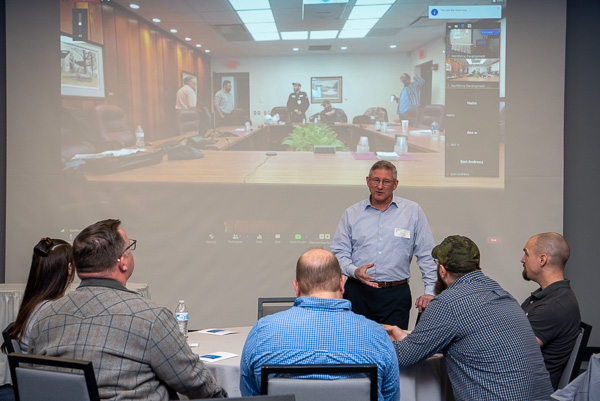
As the apprentices (on screen) finish their final class in a nearby conference room, Fry talks with West Pharmaceutical Services representatives.
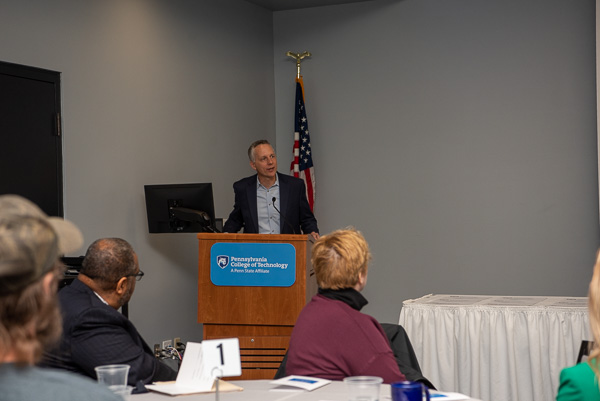
Reed affirms Penn College's robust partnership with business and industry, and congratulates the graduates on their enhanced job skills and career outlook.
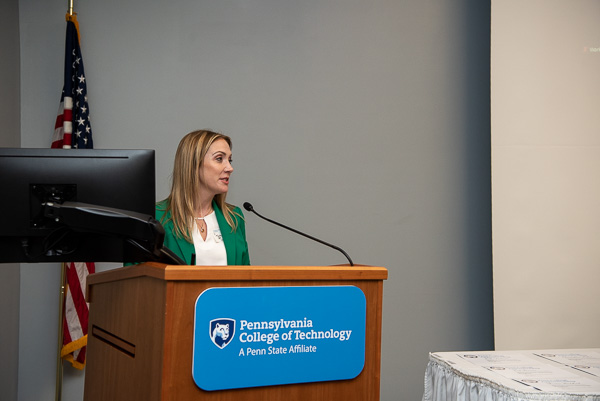
Loew discusses the program's "learn as you earn" model, noting that "apprenticeship completers on average earn at least $70,000 annually upon graduation and typically have little to no debt."
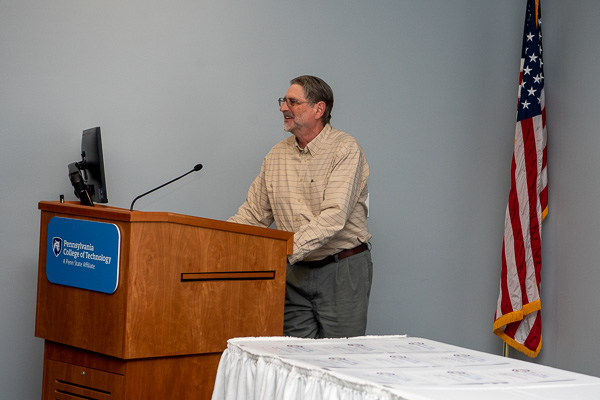
Applauding the graduates for "staying committed to the cause," Kuhar told them: "You're a unique class. No one just handed it to you."
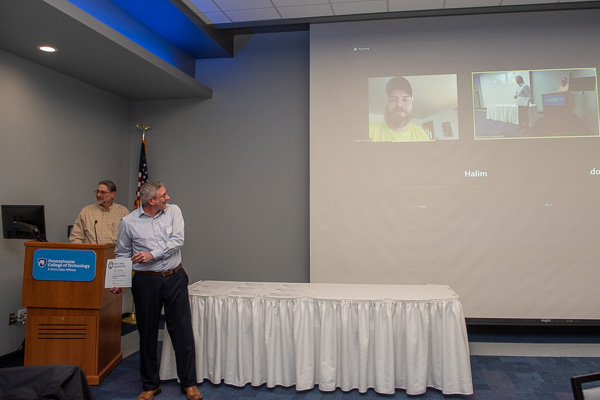
A high-tech transfer between Andrews (on screen) receiving his certificate and Fry showing it to him on camera ...
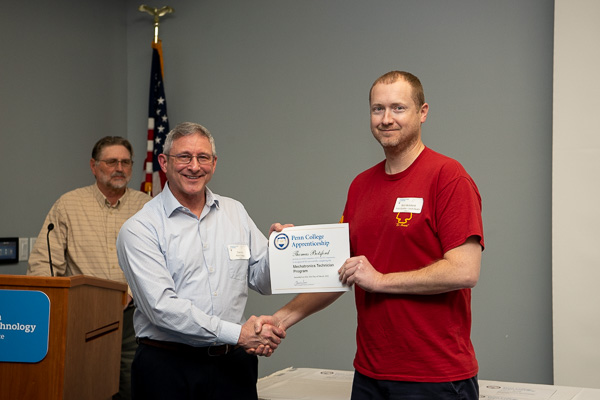
... and a more traditional exchange, with Botsford on the receiving end.
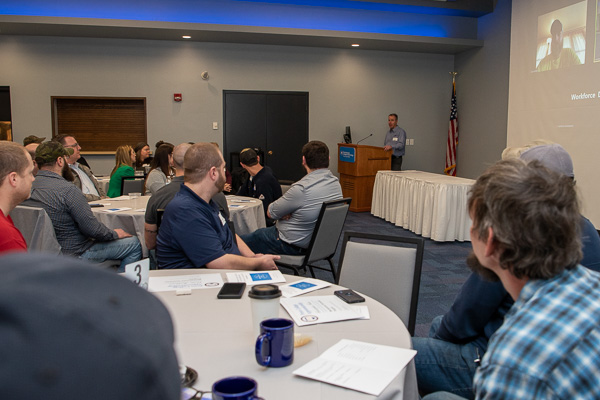
Graduates and their supporters listen as Ray recaps the challenges of launching an apprenticeship initiative, only to pivot due to COVID-19 limitations. "It is a testament that so many of you began this program and successfully completed it," he told them.
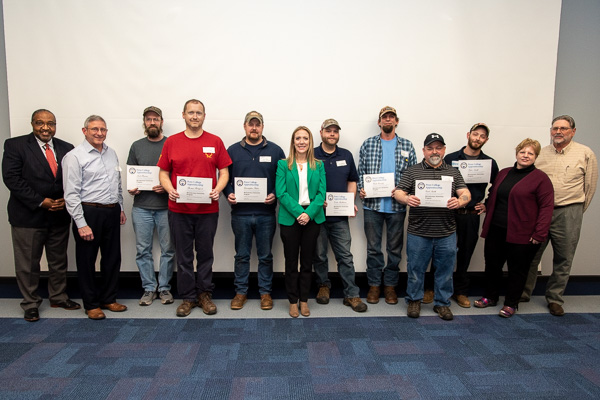
The group expands to include the apprentices' proud advocates. From left: Joseph Bass, apprenticeship and training representative for the state's Apprenticeship and Training Office; Fry; Barnes; Botsford; Fisher; Loew; Stackhouse; Greenly; Carl Smith; Tyler Smith; Christina Miller, ATO apprenticeship and training representative; and Kuhar.